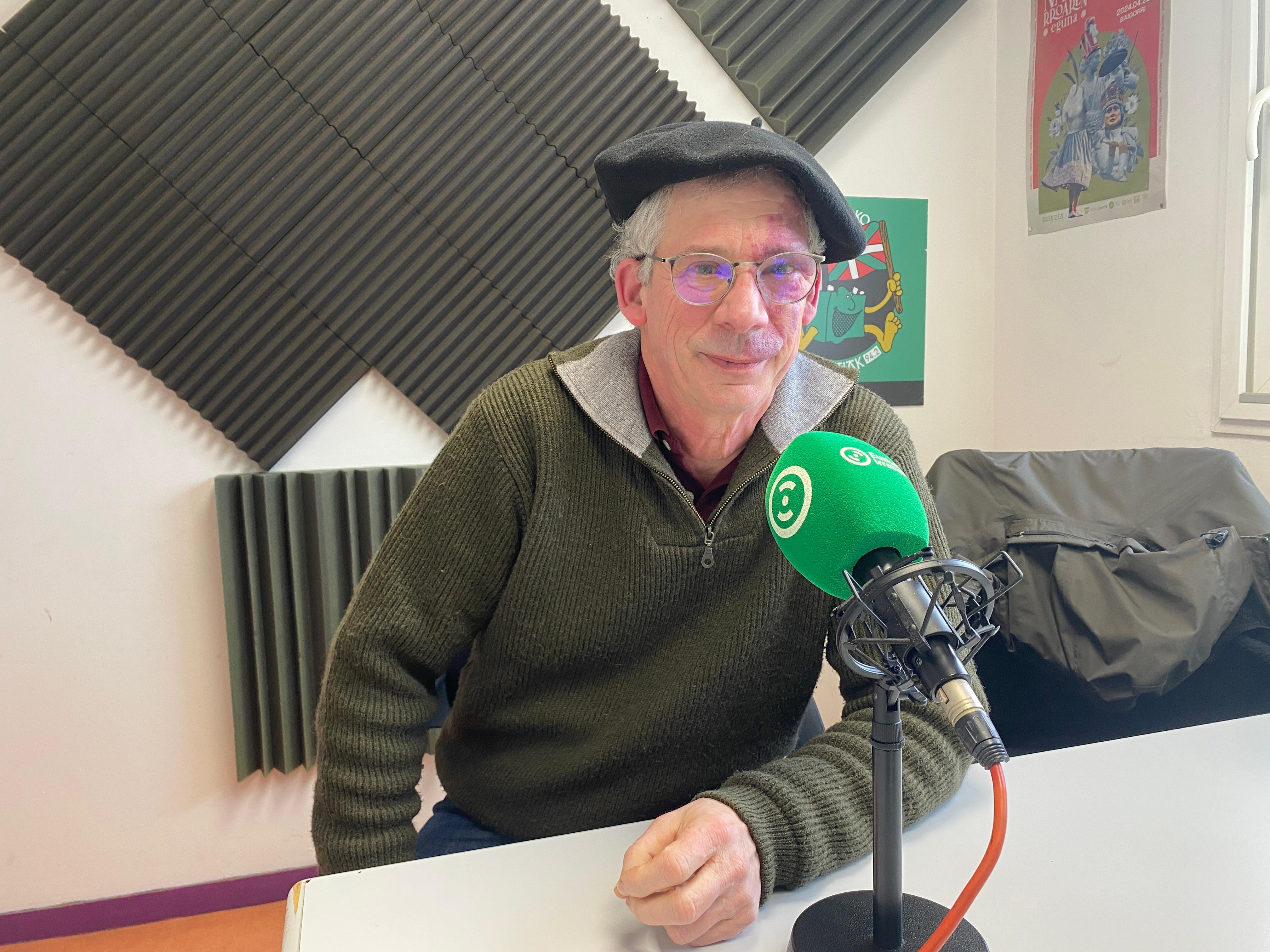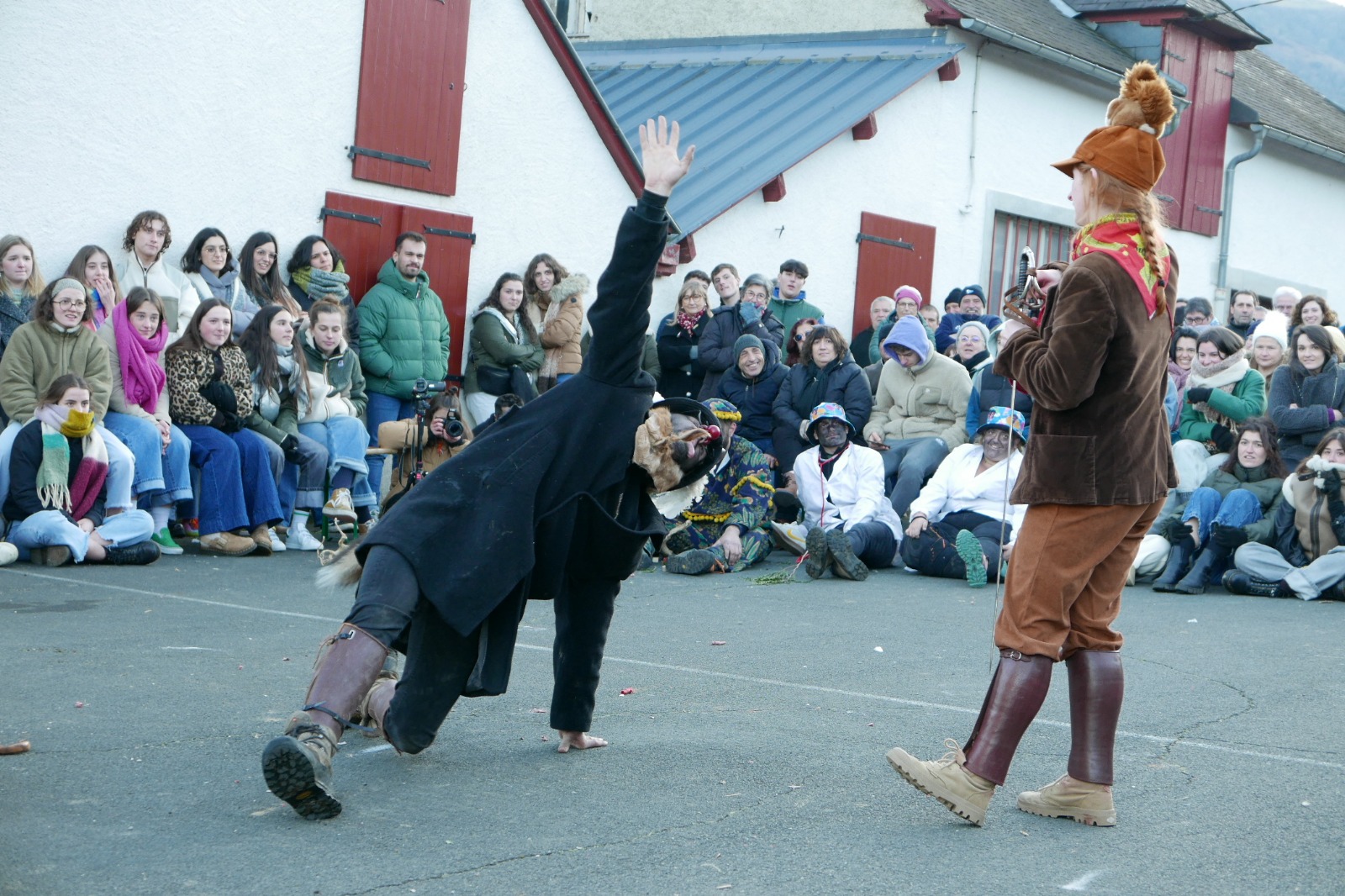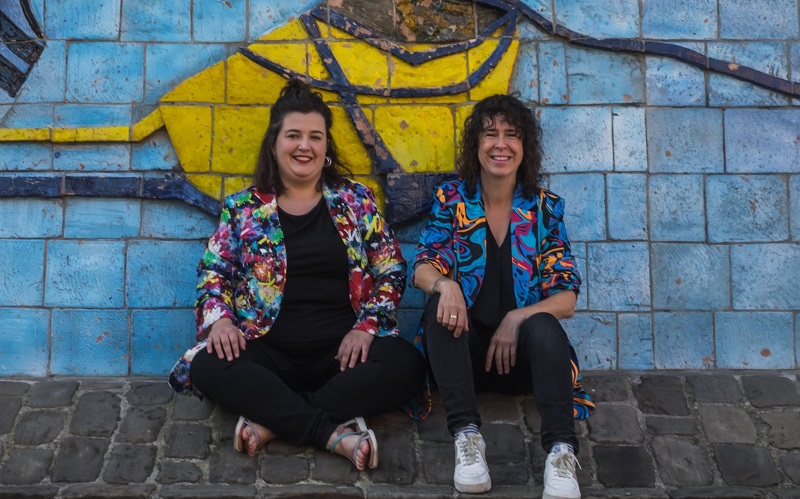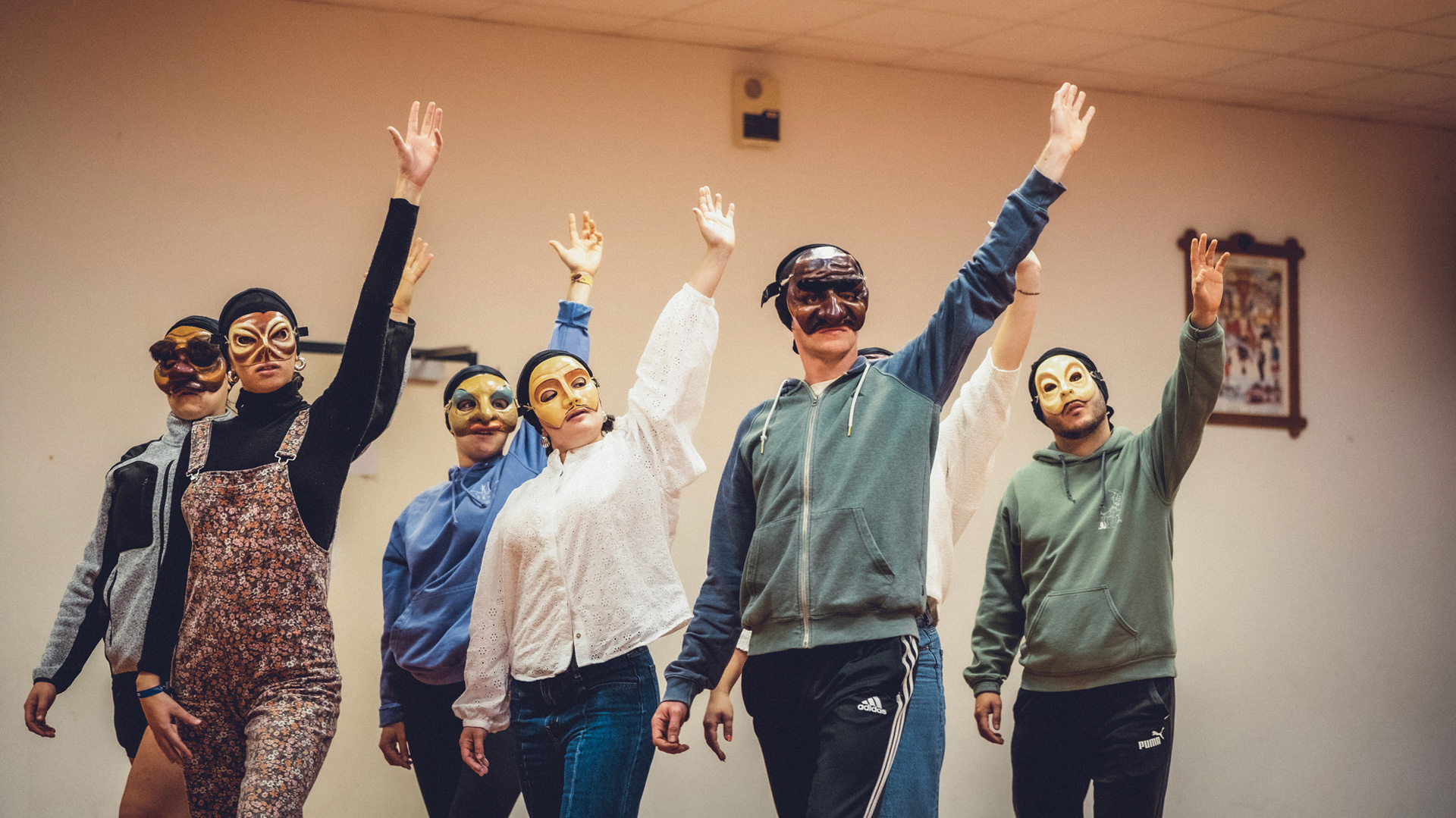"For the first time in your life you will see HIV in the people"
- In 2013, Xabin Fernández (Legorreta, Gipuzkoa, 1985) received a phone call from the doctor. They gave her a clear diagnosis. HIV. “You’re seropositive.” Life then gave her a 360-degree spin. Ghosts appeared like fear, anger and shame. From the outset, however, he had in mind the phrase: “Whatever happens, with this I will do something once.” And it does the word: it has opted for interpretation. Why not do a theater play?

Ten years after diagnosing the virus, he goes onstage to publicly tell his personal trajectory. The actress Intza Alkain (Lasarte-Oria, Gipuzkoa, 1995) has been her travel companion taking the role of "famous" virus. On this journey, Fernández and Alkain have been led by Aitziber Garmendia and Sara Cozar. They have taken advantage of the humor to put in front of the attendees of the theatres of Euskal Herria the reality of HIV. Fernandez is naked in public with all that this entails.
Has it been difficult to enter the inner world of a fictional character instead of yourself?
Xabin Fernández: At first I was very afraid, but when we got together the whole working group around the table, one of the first tips Aitziber [Garmendia] gave me was to set limits on the character, to decide how far I was going to be and from where we would build the character. He told me that I had to take a little distance, that I couldn't give 100 percent of myself, that I had to be the character as well. This advice wasn't that hard.
You, Intza, make the virus. How did the project come to you? Did you know the story?
Intza Alkain: When they called me from the producer and explained the project and the story to me, I felt a bit of fear. I didn't know Xabi, and being a story based on her seropositive experience, even more so. But when I was told who we would be in the lecture, I didn't think twice. I found that an interesting challenge.
Stage the real story of what the stage is going to be, how have you managed it?
I.A. : At first it seemed to me a very sensitive issue, but from the beginning it was no longer taboo. We talked a lot with each other and each of them told their experiences. That has done everything very light, we have laughed a lot. And as Xabin said, taking distance is important. Humor has been very present in the creative process and we reflect that in the play.
.jpg)
In Xabi, in 2013 he knew he was HIV positive. You said that you were clear that you would end up doing something. What has taken you to the theater?
F.X. : Life has taken me a little to that. The doctors told me to slowly and slowly, to take it quiet, and that caused me to get angry. I believe that this reaction led me to talk about the issue, because in Euskal Herria there is no talk about HIV naturally. But in the end, in the short term, I was not able: I entered a dirty cage for a long time. Later I thought about giving the form of
a documentary, but after the pandemic I went to the Performing Arts workshop in San Sebastian, as it gives me a new illusion. The theater has always drawn me. And from the very beginning I felt very comfortable and comfortable. At first it was a dream and a short-lived wager, I didn’t think it took the form it took.
Xabin Fernández: "Let's put HIV on the table and show where we are now."
How does knowing that you are seropositive affect a person's life?
F.X. : A second changed life. I didn't wait and I got the news through a phone call. So I was at home, alone, and I wasn't able to ask too much. I cut off the call and started crying. I was very scared because I had a lot of lack of information, because it was very unknown to me. The first few days I had a really bad time, and I thought to turn the situation around would help me count the environment, talk to yours and friends. Then I didn't find that courage, although I did it with some. I remember when I was in bed the first few days, I was like, “This is forever, this is not back.” At the time I saw everything very black.
Have things changed in prejudices toward disease? Or do you think it's still stigma to be seropositive?
I.A. It remains. I, for example, have learned a lot from the work, but before I got into the project, HIV was very unknown, it mixed many concepts. I don't know if my case is general.
F.X. : It seems to me from experience that things have not changed in recent years, precisely because there is no talk of it. It has remained in the same situation, I do not know whether cases have increased or decreased, but the infection rate is still quite similar. That reality is here, it's been here for these years, but you don't talk about it, and a lot of people think it doesn't exist. Many people have told me that they don't know what it is and that's why they've also felt guilty.
Maybe we tend to think that HIV and a thousand other realities are foreign things...
I.A. : Everyone knows Freddie Mercury was HIV positive. And the best-known cases have always been very crude, drug-related and sex-related. Teaching what today is a virus in Euskal Herria can help take away that ghost and becomes something that can happen to you too.
F.X. : And HIV is there, but it has nothing to do with what it was decades ago. So let us put the information on the table and show where we are now.
Being from Legorreta, with 1,500 inhabitants, it is more difficult. A village has good things, but also bad things, and that pressure is there. A small town is like an arrival of pressure. I always think that if I was born in San Sebastian I could take him in a different way. That is why my illusion is to bring the work to the small towns and face the virus. In the work we say: “For the first time in your life you will see the virus in your people.”
.jpg)
What reception are they receiving?
F.X. : Many know what we're going to talk about, but they don't know what they're expecting, they don't know if they laugh or cry. Many recognize that they come a little bit of “tension,” but then most go much quieter. Some people cry, but you hear more laughter.
Humor has a lot to say in this.
F.X. : I knew many people would come to see, and I didn't want it to come out with a dark sensation. Now I'm much better at another point, and I wanted to reflect it. Humor is useful for taking distance and giving another point of view, and that's been my bet from the beginning. When we started working, and having Intza, Aitziber and Sara [Cozar], we saw clearly that that was the way, and we also had to reinforce more. At first there was humor, but in the process of creation the shadow of humor has long elongated.
Have you achieved the balance between humor and crudety of the subject?
I.A. I think so. I've been told by a lot of people that the moment Xabi tells their story during the theater, they feel a lot of empathy, they're very stuck, and all of a sudden, like a slap, they come out with humor and laugh at what they're crying about. This distance exercise is performed at all times. The production code is very cool.
F.X. : At first there was fear: “Are we going to happen?” Sometimes Aitziber asked me: “Listen, if we say this, do you think it will happen?” We have made progress on many things.
During these months many HIV-positive people have come to see the work and for me their feedback has also been very important. Greater impact on the general public. Some have told me that perhaps we have become uncomfortable depending on the situation they are experiencing, but they have thanked us for the tone we have given to the work and they have been satisfied. That is the best thing for us.
Intza Alkain: "The story is made real and feeling identified in front of him is very easy"
How do you take on the stage ten years of personal life?
F.X. : In these ten years I have written several things and the hardest thing has been to shape it. At one point I decided I had to choose some of the 5,000 roles I had, some key moments of this decade. It has been a demonstration exercise.
How much fiction and reality do you have?
F.X. : It has a lot of reality. It is not only the story, many of the elements we have used are part of my reality. For example, pill boats, which I have been accumulating for ten years so that those in the house do not see them. I also wear my grandfather's pants and sometimes you hear my grandmother's voice. In this sense, this work is very mine.
You enter the cage physically, literally and emotionally. Can it serve to free people who have been or are locked up?
I.A. : The story is truly made and feeling identified in front of him is very easy. Humor helps to alleviate the issue.
F.X. : And although not the same, cages in the end are in many houses in many ways.
I.A. : We have also put mental health on the table and in the process we have been identified with the problems of our life. When someone tells their story, maybe the attachment also tells it and opens. When someone opens the other opens.
F.X. : Some have opened with me. I realized I wasn't the only seropositive in Euskal Herria.
.jpg)
They say in the play that in society there are diseases that have a major role, such as cancer, and that campaigns on them are carried out very often. Why do you think HIV is "silenced," perhaps by stigma?
F.X. : The two ghosts that have surrounded HIV have always been sex and drugs. Everything is related to "dirt" and that's why we keep it quiet. Cancer has also had it, and in its day it was very badly known, but as we mentioned in the play, that has also changed, fortunately, and today there are many campaigns. Maybe within a few decades, things change with HIV as well.
We all wear a mask. What does public nudity bring? Give more than it takes away?
F.X. It's taken a lot of weight. Face helps a lot in everyday life.
It's somehow taken away my anonymity, it's even been a little violent, because in the end you have to go onstage to tell first-person things that have happened to you. Give me, it's given me peace of mind, and I stick with that.
ERREALITATEAREN HARRIBITXIAK
Nork: Josu Iriarte, Nerea Lizarralde, Jare Torralba eta Amets Larralde. Mikel Martinezek zuzenduta eta Jokin Oregiren testuetatik abiatuta.
Noiz: otsailaren 21ean.
Non: Bilboko 7katu... [+]
Vagina Shadow(iko)
Group: The Mud Flowers.
The actors: Araitz Katarain, Janire Arrizabalaga and Izaro Bilbao.
Directed by: by Iraitz Lizarraga.
When: February 2nd.
In which: In the Usurbil Fire Room.
Duela hemeretzi urte berpiztu zen libertimenduen usadioa Donibane Garazin. Antton Lukuk abiatu zuen mugimendu hori, eta bi hamarkadetan, Ipar Euskal Herriko herri desberdinetara ez ezik, Hegoaldera ere hedatu da.
Arizona
Actors: Justin Garfield and Jon Plazaola...
WHEN: January 26th.
IN WHICH: The New Culture Center. In the square.
-------------------------------------------
The couple Margaret (Aitziber Garmendia) and George (Jon Plazaola) leave Idaho to guard the border between... [+]
AMAK
Company: Txalo teatroa.
Created by:Elena Díaz.
Address: Begoña Bilbao.
Actors: Finally, Ibon Gaztañazpi will account for the details of Intza Alkain, Tania Fornieles, Oihana Maritorena and IRAITZ Lizarraga.
When: 10 January.
Where: Auditorio Itsas Etxea... [+]
Basabürüako ibar eskuineko gazteek lehen maskarada arrakastatsua eman dute igandean, Lakarrin.
By:
Mirari Martiarena and Idoia Torrealdai.
When: 6 December.
Where: In the San Agustín cultural center of Durango.
------------------------------------------------------
The fourth wall breaks and interferes directly, standing and fearless. ZtandaP is a way of counting... [+]

















